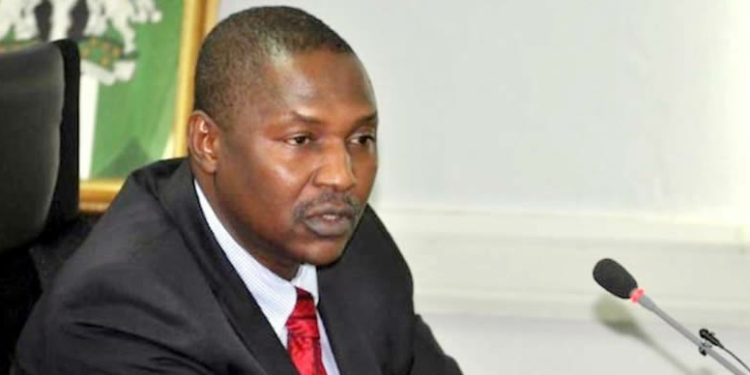Ahead of the 2023 general elections, the Attorney-General of the Federation and Minister of Justice, Mr. Abubakar Malami, said yesterday the Federal Government would collaborate with the Judiciary to ensure appointment of new justices into the Supreme Court bench.
Malami, who spoke at a valedictory court session held in honour of a retired justice of the apex court, Justice Abdu Aboki, said the appointments would be done in anticipation of expected surge in number of cases” that will arise from the general elections.
He noted that the past five months witnessed a steady reduction in the number of justices of the Supreme Court.
“With the successive exits of my lords, Hon. Justice Mary Ukaego Peter-Odili, Hon. Justice Dr. Ibrahim Tanko Muhammad, and now, the distinguished Hon. Justice Abdu Aboki, the apex court has almost returned to its pre-2020 numerical strength, with just 13 justices, as against the required 21 under the 1999 Constitution of the Federal Republic of Nigeria.
“We would work with the Judiciary and to ensure that these vacancies are filled as soon as practicable, in anticipation of expected surge in numbers of cases as we approach an election year,” Malami stated.
However, Malami’s position drew the irr of the Body of Senior Advocates of Nigeria, BOSAN, which demanded an immediate review of the appointment process it described as “unsatisfactory in the extreme”.
BOSAN, in its speech read by Chief Okakuro Okpoko, SAN, said it was worried that the appointment process “appears to have been designed and operated to exclude good and competent lawyers in the legal profession from being appointed as Justices of our Appellate Courts”.
It said: “There are two aspects of this restrictive policy by the appointing authorities. The fist is that the appointing authority appears to have established a policy that the vacancies created by exit of Justices of Supreme Court or the Court of Appeal are to be filled by picking a candidate from the state of the vacating Justice only, notwithstanding the availability of known better candidates readily at hand from other states or local government areas in case of judges at trial courts.
“The consequence of this policy is that by it, our nation, our citizens, foreign and local businessmen/women who use and or are expected to resort to the courts of law for resolution of their problems in Nigeria are denied the opportunity of having their cases considered and decided by Appellate Courts manned by the best legal minds the nation can produce at any time. This is a very sad reflection on our nation and the nation’s Judiciary.”
The SANs urged the National Judicial Council, NJC, to consider the idea of appointing Appellate Justices directly from the Bar as it was done in other countries.
“BOSAN does not see any justifiable and arguable opposition against the direct appointment of this class of candidates available for appointment in the Supreme Court and the Court of Appeal.
“The lawyers in academia and of the Bar read and write books and conduct research just as the Judges do. The skill to read and write legal opinions on appellate matters is undeniable.
“The lawyers from the private bar who practices law on a daily basis in all courts and lawyers from the Ministries of Justice who conducts government cases have necessary skills that can greatly enhance the works of the Appellate Courts.
“Today, the NJC ignores these sources of recruitment and prefer to appoint candidates on the basis that they have served as Magistrates and Sharia Courts and Customary Courts Judges as a condition for appointment into the Appellate Courts”.
On election related cases, BOSAN warned judges and lawyers against compromising justice for material gains.
“In the ambition to stay politically relevant and or dominate, some politicians will go to any length to secure favourable verdicts even when they and their lawyers know that they do not deserve such victory.
“In the process, they have no qualms as to the extent they want to compromise the administration of Justice.
“We should be reminded always that our laws must speak the same language in political and election cases as in other cases and situation”, BOSAN added.
Meanwhile, in his speech at the event, the Acting Chief Justice of Nigeria, CJN, Justice Olukayode Ariwoola, described Justice Aboki who bowed out of active judicial service on August 5 upon clocking the 70 years statutory retirement age, as an enigmatic personality whose name became a recurring decimal in the annals of the Nigerian Judiciary, owing to his “robust scholarly disposition and alluring erudition.”
The CJN decried that with Justice Aboki’s exit from the bench, the workload on Supreme Court Justices will increase.
“His Lordship’s exist from our fold has drastically depleted our ranks and opened a yawning gap that will hardly be filled.
“From a relatively encouraging number of 17 justices at the dawn of 2022, just like a flash in the pan, the number has suddenly dropped to 13 Justices.
“Like we all know, a single drop in the number of Justices here brings about a sudden increase in our workload as the inflow of appeals to the Court is ever on the increase due to the highly litigious nature of Nigerians,” the CJN stated.










Discussion about this post